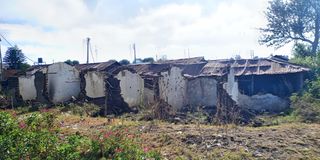My Hood: A Nakuru estate held back by baboon invasion

Some of the dilapidated houses in Free Area after the home owners fled due to the baboon invasion.
For residents in Free Area estate, exponential growth was something they expected.
The unlimited access to scenic views of the park and proximity to the city centre counted as perfect ingredients for a highly esteemed address.
Sadly, this area lags behind because of human-wildlife conflict thanks to the baboons that are turning this estate into their home.

Baboons resting on the roof of a rental house in Free Area ,Upendo area
When Mtaa Wangu visited the area, it was characterized by households with rusty roofs, with some residents referring to it as chocolate city.
Other houses were deserted with the doors and windows missing while others had electric fences surrounded by razor wire.
Having moved in the Estate in 1982, Elizabeth Kafura, popularly referred to in the estate as Mama Flo says she was attracted to the area by the fertile lands and proximity to the park.

Esther Kafura a resident from Free Area talks on how they can not grow food in their homes .
She says the area was less populated at the time with most of it being homesteads and farm lands.
“I would harvest sacks of maize, beans, potatoes and even have a home garden. However, things took a drastic turn in 1996 when the baboons started invading residential areas. At this point no farming practice can be conducted. Arable land is now left as playing grounds and feeding grounds for cattle in the area,” she says.
She notes that she had contemplated moving to another location but since she had bought land and invested there, she had to bear with the baboon burden and fence of her home with electric fence and chain link.
Another resident who was born and raised in Free Area, Sospeter Gichimu says his family moved in Free Area in the 90s.

Sospeter Gichimu a resident in Free area talks on how emerging estates have overtook them due to human wildlife conflict.
He expected as they grew up then the estate would have grown.
“People want to live and invest in places where they get value for their money. In Free area baboons have made people forget what it means to live in a serene, quiet and peaceful place,” he says.
He notes that over the years emerging estates, like Keratina, Whitehouse, Baranabas and Pipeline have been a safe space where residents from Free area run to.
Other than that, he notes that deserted homes along the park fence have turned to be a hub for criminal dealings and a spot for young boys to abuse drugs.
“For this reason, mugging has also escalated in the neighbourhood.”
He notes that the only reason he thinks the estate has not turned into a ghost town is because there are public schools which appeals to those not fortunate enough to afford private schools.
“Even with a market, public schools, a police station and proximity to the highway we are still lagging behind,” he says.
